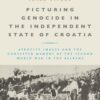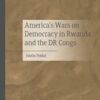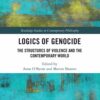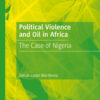Books

The End of the Ottomans: The Genocide of 1915 and the Politics of Turkish Nationalism
Edited by Hans-Lukas Kieser, Margaret Lavinia Anderson, Seyhan Bayraktar, and Thomas Schmutz. In the early part of the twentieth century, as Europe began its descent into the First World War, the Ottoman world – once the largest Empire in the Middle East – began to experience a revolution which would culminate in the new, secular Turkish state. Alongside…
Read more
The Women of the Arrow Cross Party: Invisible Hungarian Perpetrators in the Second World War
By Andrea Pető. This book analyses the actions, background, connections and the eventual trials of Hungarian female perpetrators in the Second World War through the concept of invisibility. It examines why and how far-right women in general and among them several Second World War perpetrators were made invisible by their fellow Arrow Cross Party members in…
Read more
Special Issue of Continuum: ‘The Perpetrator of Crimes Against Humanity in Global Documentary Film’
Edited by Fernando Canet. This special issue of Continuum: Journal of Media & Cultural Studies sets out to explore how the figure of the perpetrator of political violence is represented in recent documentary film (2000–2019) across a broad variety of cultural and political contexts. The special issue features a comprehensive introduction contextualizing the study of…
Read more
Picturing Genocide in the Independent State of Croatia: Atrocity Images and the Contested Memory of the Second World War in the Balkans
By Jovan Byford. Picturing Genocide in the Independent State of Croatia examines the role which atrocity photographs played, and continue to play, in shaping the public memory of the Second World War in the countries of the former Yugoslavia. Focusing on visual representations of one of the most controversial and politically divisive episodes of the war…
Read more
The Holocaust/Genocide Template in Eastern Europe
Edited by Ljiljana Radonić. The book focuses specifically on how “mnemonic warriors” employ the “Holocaust template” and the concept of genocide in tendentious ways to justify radical policies and externalize the culpability for their international isolation and worsening social and economic circumstances domestically. The chapters analyze three dimensions: 1) the competing narratives of the “universalization…
Read more
America’s Wars on Democracy in Rwanda and the DR Congo
By Justin Podur. This book examines US interventions in the Democratic Republic of the Congo and Rwanda – two countries whose post-independence histories are inseparable. It analyzes the US campaigns to prevent Patrice Lumumba from turning the DR Congo into a sovereign, democratic, prosperous republic on a continent where America’s ally apartheid South Africa was…
Read more
Logics of Genocide: The Structures of Violence and the Contemporary World
Edited by Anne O’Byrne and Martin Shuster. This book is concerned with the connection between the formal structure of agency and the formal structure of genocide. The contributors employ philosophical approaches to explore the idea of genocidal violence as a structural element in the world. Do mechanisms or structures in nation-states produce types of national…
Read more
Political Violence and Oil in Africa: The Case of Nigeria
By Zainab Ladan Mai-Bornu. The book argues that in order to better understand the undercurrents of the Niger Delta conflict, it is imperative to analyse the dynamics of choice in terms of the distinct courses of action taken by the Ogoni and Ijaw. Given the similar structural constraints, the author considers why the Ogoni adopted…
Read more
The Moral Triangle: Germans, Israelis, Palestinians
By Sa′ed Atshan and Katharina Galor. In The Moral Triangle Sa’ed Atshan and Katharina Galor draw on ethnographic fieldwork and interviews with Israelis, Palestinians, and Germans in Berlin to explore these asymmetric relationships in the context of official German policies, public discourse, and the private sphere. They show how these relationships stem from narratives surrounding moral responsibility,…
Read more
On Inhumanity: Dehumanization and How to Resist It
By David Livingstone Smith. The Rwandan genocide, the Holocaust, the lynching of African Americans, the colonial slave trade: these are horrific episodes of mass violence spawned from racism and hatred. We like to think that we could never see such evils again—that we would stand up and fight. But something deep in the human psyche—deeper…
Read more
